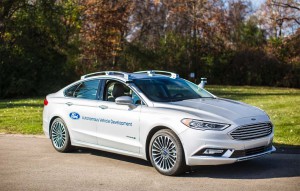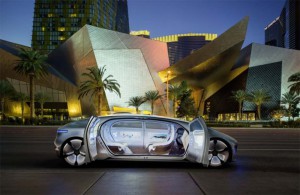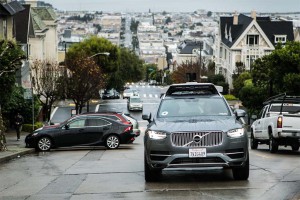Daimler AG, the parent of Mercedes-Benz, says it is teaming up with mega-supplier Bosch to develop a driverless car the partners plan to put on the road by 2021.
The announcement follow new that Daimler had struck a deal with Uber, the ride-sharing giant that hopes to significantly lower its operating costs by fielding fleets of driverless vehicles. It also comes a day after a new study was released by Navigant Research naming Daimler one of the leaders in the fast-emerging field of autonomous driving.
“The prime objective of the project is to achieve the production-ready development of a driving system which will allow cars to drive fully autonomously in the city,” said a statement announcing the new Daimler-Bosch partnership. “The idea behind it is that the vehicle will come to the driver, not the other way around.”
(New study names leaders in autonomous vehicle research. Click Here for the full story.)
Industry groups have defined five levels of autonomous vehicles, starting with Level 1 technology capable of offering minimal assistance to a human driver, such as forward collision warning. Many automakers and suppliers are focusing on Level 2 and 3 systems in which the vehicle can take control under good conditions, though an “operator” must remain behind the wheel, ready to take over at a moment’s notice.

Daimler was named a leader in autonomous technology by a new study, though Navigant Research said Ford was in the lead.
The Daimler-Bosch project appears focused on developing the most advanced, Level 5 system in which a human is never needed to operate the vehicle – and it may not even be equipped with conventional controls, such as a steering wheel and pedals.
That concept is something that would be ideal for what the two partners described as “urban automated taxis,” rather than for cars retail customers would own. While it was not directly cited by Daimler and Bosch, the new project clearly has a potential market with Uber, which Daimler recently inked a separate deal with.
Travis Kalanick, the CEO of that ride-sharing service has repeatedly expressed his interest in eliminating the human drivers that make up the largest share of Uber’s costs. That would bring down the price of a ride, Kalanick has promised, to the point where it would be cheaper to rely on a ride-sharing service than owning a personal vehicle.
Long the stuff of science fiction, the Daimler-Bosch statement said the goal is to make this “a reality on city streets by the start of the next decade.”
The timing coincides with what Ford Motor Co. said it is aiming for. Last year, the Detroit automaker said it wants to launch production of fully driverless vehicles by 2021, adding that it will initially target ride-sharing services and delivery fleets.
There is significant interest in launching both autonomous and fully driverless trucks, as well as robo-cabs. Several companies are exploring that option, including Daimler’s Freightliner subsidiary, as well as Otto, a start-up recently acquired by Uber. (Otto is at the center of a lawsuit against Uber filed by Waymo, the autonomous vehicle spin-off of Google, which claims two of the autonomous truck firm’s founders stole intellectual property.)
(Waymo, Uber go to court over alleged theft of autonomous vehicle tech. Click Here for the latest.)
The Daimler-Bosch announcement comes a day after Daimler was listed as running the fourth most advanced autonomous vehicle program in the industry, according to a new study by Navigant Research. Ford topped the list, followed by General Motors and Renault-Nissan.
Waymo, traditionally considered the leader in developing autonomous technology, slipped behind those traditional automakers. The problem, said Navigant researcher Sam Abuelsamid, was that it didn’t have “a pathway to production.” Among the study’s 10 criteria, that was considered one of the most critical. The Daimler-Bosch project appears to give the two partners that path.
(Uber autonomous car crashes in Arizona. Click Here for the story.)


